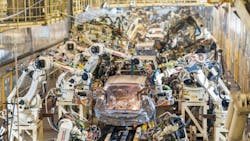Toyota Motor Corp. (IW 1000/8) said annual net income will probably decline for the first time in five years, as currency swings that had spurred record profits now pose stiff headwinds.
Net income may drop 35% to 1.5 trillion yen ($13.8 billion) for the fiscal year ending in March, Japan’s largest company said on May 11. The forecast trailed the 2.19 trillion yen average of 23 analysts’ estimates compiled by Bloomberg.
President Akio Toyoda has presided over three straight years of record annual profit, as a weakening yen boosted earnings from Japan-exported Corolla compacts and Lexus RX SUVs sold overseas. Building new plants outside Japan and other measures that could insulate earnings against yen swings have taken on added urgency, with the currency strengthening more than 10% against the dollar this year and Toyota’s sales growth in the U.S. staling.
“We have benefited from an exchange rate tailwind that has helped raise our earnings above the level of our true capabilities,” Toyoda, 60, said in Tokyo. “We believe that we have built up the strength to take on these challenges. However, our initiatives are still in the implementation phase.”
Foreign-exchange rate changes probably will reduce operating profit by about 935 billion yen in the year started April 1, the company estimates. The negative impact estimated by the company exceeds the amount of profit that Nissan Motor Co. and Honda Motor Co. forecast for the year ended in March.
Toyota paid a dividend of 210 yen per share for the annual period ended in March, up from 200 yen per share the year earlier. The company plans to buy back another 500 billion yen in shares after repurchasing 639.3 billion yen the last fiscal year.
After Japan’s most devastating earthquakes since March 2011, Toyota has revived domestic assembly lines to make up for lost production of about 80,000 vehicles. Japan factories that accounted for about 40% of the cars and trucks the company produced last fiscal year also shut for one week in February, due to a steel factory fire.
Global Sales
Recovering some of that output will be crucial to Toyota extending its reign as the world’s top-selling automaker to a fifth-straight year. The company fell behind Volkswagen during the first three months of 2016, with deliveries dropping 2.3% to 2.46 million units. Despite an emissions scandal that’s escalated to the worst crisis in Volkswagen AG’s history, its deliveries rose 0.8% to 2.5 million.
Toyoda closed negotiations with the company’s labor union in March by saying business circumstances had changed, citing currency swings and stricter environmental regulations in emerging markets. The company raised base monthly wages by just 1,500 yen for this fiscal year, half the increase workers had requested.
The grandson of the company’s founder has overseen a series of strategic longer-term moves that could help meet tougher fuel economy and emissions rules and shield the company from the effects of foreign-exchange rate changes.
Emissions Target
Toyota has set a target to almost eliminate conventional gasoline engines from its lineup by 2050 as a means to achieving a 90 percent reduction in emissions from its vehicles. The goal served as a wake-up call to Toyota group suppliers that will need to transform their businesses to make components for hybrids, fuel cell vehicles and plug-in electric autos.
The automaker is scheduled to build car factories in Mexico and China before the end of the decade, ending a suspension from adding new assembly plants since 2013. In the meantime, it’s honed an in-house global architecture system it sees cutting costs for new plants by 40% and product development by 20%.
Reducing costs will be crucial to maintaining affordability of cars Toyota plans to equip with more safety-related systems. The carmaker plans to make automated braking standard on almost all Toyota and Lexus models in the U.S. by the end of next year, four years ahead of a voluntary agreement automakers and regulators announced in March.
Toyoda has laid down a $1 billion bet on artificial intelligence and robotics to further advance development of vehicles that will be more capable of driving themselves and keeping drivers from getting into collisions. The Toyota Research Institute that started operating in January is led by Gill Pratt, the former program manager for the U.S. Defense Advanced Research Projects Agency’s robotics efforts.
About the Author
Bloomberg
Licensed content from Bloomberg, copyright 2016.
